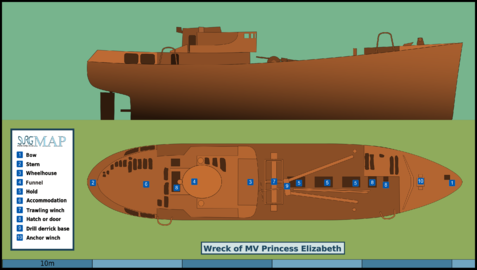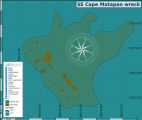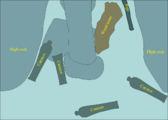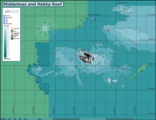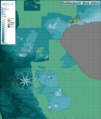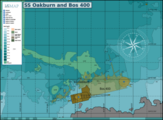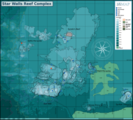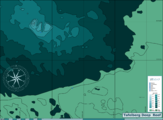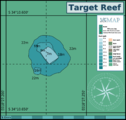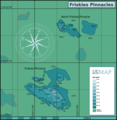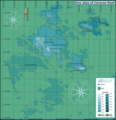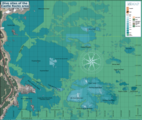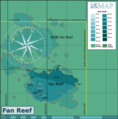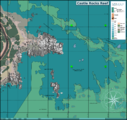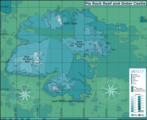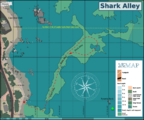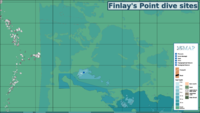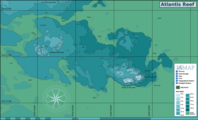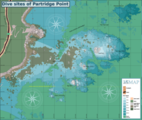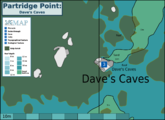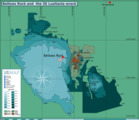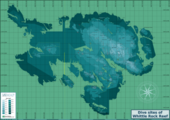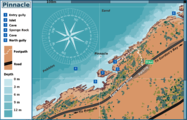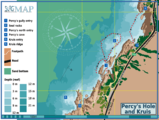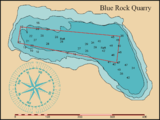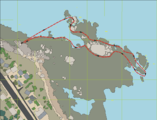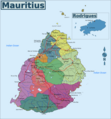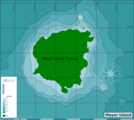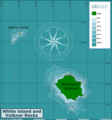|
This is the current user page of Peter Southwood, who previously edited Wikitravel with the same username, and whose imported user page is archived at User:(WT-en) Pbsouthwood, in the form that it was imported into Wikivoyage, as a historical document and for attribution purposes. |
| |||||
| |||||
| |||||
I am surveying and mapping the dive sites of Cape Town as a long term project. Wikivoyage is how I make this information available to the public on a frequently updated format.
Most of the surveys are done by towing a surface marker buoy on a tight tether along a chosen depth contour, then after the dive I download the GPS track,clean it up a bit, transfer it to Inkscape and trace around it to show the shape of the contour. A similar process is used for the outlines of reefs and wrecks, and some details are simply measured and sketched on site. On rare occasions the visibility is good enough to use photos and video to provide details.
Since March 2011 I have had access to unpublished data from the SA Council for Geoscience which did a sidescan sonar survey and fascies interpretation of parts of False Bay and the Atlantic seaboard of the Cape Peninsula for a reef ecology monitoring project. This data lacks detail of depth and can be difficult to interpret with precision, but it is excellent for identifying roughly where all the rocky areas are. However it is limited to places where the sonar fish is not likely to hit rocks, so there is still plenty of reef that has to be identified and mapped in other ways in the close inshore zone, Also it does not give depth profiles. The main value is that it is possible to be reasonably sure that most reef has been identified in these zones. The Council for Geoscience also does multibeam sonar mapping, much of which is in deeper water than I care to dive, and they tend to avoid the shallow rocky places where some of the best diving is found, because it is a high risk to their expensive and relatively fragile equipment - they don't want to hit uncharted rocks.
Most of the boat access sites were mapped from Blue Flash charters boats, as Blue Flash caters largely for a fairly regular clientele of advanced local divers, and is more inclined towards exploring new areas and opening up new sites, and a moderate number from Dive and Adventure, Pisces Diving and Indigo Diving boats. Blue Flash charters supports this project by allowing me a special rate for boat dives. The shore dives were done under my own power, usually alone, but sometimes with a few buddies who are prepared to swim along with me while I survey. More recebtly I have also surveyed from the RIB Wreckless and the larger dive boat Wreckless II.
I would welcome participation from other local divers, but so far I have been unable to persuade any of them to actually go out and survey.
I was made an admin on Wikivoyage during the migration, and it seems to have stuck. I am available to help with admin type tasks when needed, but tend to concentrate on dive guides and related articles, where this level of access is not needed very often. I also make an effort to keep up with any policy discussions and decisions.
Contact me by leaving me a message on my talk page (preferred), or via email, if necessary. I also spend a lot of time at English Wikipedia with the same user name.
|
If you are looking for information on surveying dive sites using a GPS towed on a buoy, click here |
Statistics
edit- 3 pages in Category:Scuba diving
- 10 pages in Category:Diving in South Africa.
- 211 pages in Category:Diving the Cape Peninsula and False Bay
Merges to do
editShortcuts
edit- User:Pbsouthwood/Surveys to do list
- TUSC account token 6c5c62647436f1968bb72942392cb2d8
- DerivativeFX
- Basic upload form on Commons
- GLAMorous (Commons image usage on Wikimedia projects)
- CatScan
- http://meta.wikimedia.org/wiki/Help:Parser_function
- http://meta.wikimedia.org/wiki/Help:Magic_words
- http://www.mediawiki.org/wiki/Help:Extension:ParserFunctions
- mw:Extension:CategoryTree
- User:Pbsouthwood/Dive site listings
| Pbsouthwood's Wikimedia accounts: | |||||

| 
| 
| 
| ||
| Commons | Wikipedia | Wiktionary | Wikibooks | Wikinews | Wikivoyage |

| 
| 
| 
| 
| |
| Wikisource | Wikiquote | Wikiversity | Wikispecies | Meta | Foundation |
- http://www.mediawiki.org/wiki/Manual:Interface/Sidebar
- Mediawiki:Sidebar
- Mediawiki:Sitenotice
- Wikivoyage:Directory of project development pages
- Diving the Cape Peninsula and False Bay
- Dive sites of the Cape Peninsula and False Bay
- Diving in South Africa, Diving in South Africa/Sardine run and Diving in South Africa/SS Cariboo wreck
- Scuba diving
- Diving in New Zealand
- Cruising on small craft
Other South African dive regions
editExternal
editUser pages
editWikivoyage useful links
editLocation
editRoles
editMy home turf is the Cape Peninsula and False Bay, in which region I have logged over 2000 dives at a large range of sites, some of which I have mapped. I am not currently affiliated to any recreational diving certification agency, nor employed by a dive shop or dive charter business.
- Please feel free to ask me any questions about these topics and I will try to provide a useful answer.
Projects
editCurrent projects
editThe first and main project: Diving the Cape Peninsula and False Bay
editI would also like to extend the range of dive sites to other parts of the country, preferably with collaboration from divers who live in the areas.
- The regional dive guide Diving the Cape Peninsula and False Bay has been promoted to star (28th November 2010)
Dive sites with star potential: — to be upgraded at about 1 site per season (summer/winter)
- Diving the Cape Peninsula and False Bay/Smits Reef
- Diving the Cape Peninsula and False Bay/Coral Gardens (Oudekraal)
- Diving the Cape Peninsula and False Bay/Justins Caves
- Diving the Cape Peninsula and False Bay/Geldkis
- Diving the Cape Peninsula and False Bay/Strawberry Rocks
- Diving the Cape Peninsula and False Bay/Star Wall
- Diving the Cape Peninsula and False Bay/North Paw
- Diving the Cape Peninsula and False Bay/Castle Rocks
- Diving the Cape Peninsula and False Bay/Long Beach Simon's Town
- Diving the Cape Peninsula and False Bay/SS Clan Stuart
- Diving the Cape Peninsula and False Bay/SAS Fleur
- Diving the Cape Peninsula and False Bay/Atlantis Reef
Other projects
edit- Getting Scuba diving up to star standard.
- Creating Diving in New Zealand and getting the main article up to usable status.
- Diving in South Africa is intended as an article between Scuba diving and local diving guides for South Africa.
- Assisting with Diving in Hermanus, Diving the Tsitsikamma, Diving Sodwana Bay, Diving Aliwal Shoal and other regional guides
- Developing and standardising structure for continental, national and local level diving guide articles. Producing templates where they may be useful. Editing diving guide articles to get them to fit the current structure, and hopefully not offending too many past contributors to these articles.
- Providing help articles on how to create and edit dive guide articles.
- Keeping an eye on any developments in SNUBA, Snorkeling and Freediving
More or less finished and maintenance projects
editStar sites and articles
edit- Diving the Cape Peninsula and False Bay/Pinnacle has reached star status as of 3/12/2009. See archived discussions
- Diving the Cape Peninsula and False Bay/Partridge Point has reached star status as of 24/09/2010. See archived discussions
- Diving the Cape Peninsula and False Bay/Photographer's Reef has reached Star status as of 12/11/2010. See archived discussions
- Diving the Cape Peninsula and False Bay has reached star status as of 28/11/2010. archived discussions
- Diving the Cape Peninsula and False Bay/Percy's Hole has reached star status as of 30/05/2010. See archived discussions
- Diving the Cape Peninsula and False Bay/MV Aster has reached star status as of 29/08/2011. See archived discussions
- Diving the Cape Peninsula and False Bay/Whittle Rock has reached star status as of 19/04/2022. See archived discussions
Other articles
edit- Maintain Diving in Thailand
- Maintain Dive sites of Saipan
- Maintain Diving in Sweden
- Maintain Diving in the Philippines
Templates
editPlanned projects
edit- Developing Dive Guides for the whole of South Africa with the collaboration of divers in other parts of the country. Unfortunately, to date (July 2010) have had no input from other parts of the country.
- Update (October 2010): Some inland sites are now available, and Diving in Durban is based on the work of Bryan Hart of Durban Undersea Club.
Dream projects
edit- Finishing the map of the dive sites at Whittle Rock. The first 50 versions are recorded in the video animation.
- Eventually extending this system of Dive Guides and Dive Site descriptions to other parts of the world. This will have to be done as a major collaborative project and will necessarily involve input from hundreds of divers. Today, Cape Town, Tomorrow, ze Vorld! Ahahahahaha!!!!!!!!!.... Should keep me busy indefinitely. Update: Looks unlikely. So far I seem to be the only one.
Other interests include
edit- SURG (Southern Underwater Research Group) co-founder.
- Engineering, particularly underwater and low-cost solutions
- Underwater science, particularly marine invertebrates of my home waters.
- Underwater diving, Scuba and Surface supplied, scientific and recreational/technical, since 1983.
- Mapping dive sites
- Recording biodiversity of the local temperate reefs. FIN and Reef Atlas Project.
- Recording biodiversty of local and New Zealand reefs for Reef Life Survey
- Reef classification.
- Design and development of special purpose equipment for diving and underwater projects (Modular Diving Systems by Southwood Marine, and SURGware)
- Voluntary and contract work on scientific and commercial diving projects as diver and diving supervisor.
- Education, particularly relating to scientific, commercial and recreational diving. (Commercial diving instructor, ex lecturer at University of Stellenbosch, retired recreational diving instructor)
- Writing training material for commercial and recreational diver training.
- Providing comments and advice on scientific and commercial diving legislation, codes of practice, operating procedures and training policy in South Africa.
Lists
editMaps
editDive sites of the Cape Peninsula and False Bay
edit- Distribution of the dive sites of the region
Sub-region maps
edit- Dive sites from Robben Island to Camps Bay
- Dive sites from Oudekraal to Hout Bay
- Dive sites from Kommetjie to Olifantsbospunt
- Dive sites from Kalk Bay to Rocklands Point
- Dive sites from Miller's Point to Buffels Bay
- Offshore dive sites of False Bay
- Dive sites of the Gordon's Bay area
- Dive sites from Rooi-els to Hangklip
Dive site maps - Atlantic Seaboard
edit- Daeyang Family wreck dive site map
- Hypatia wreck dive site map
- Highfields wreck map
- Map of the dive site at the wreck of the SS Cape Matapan
- Map of the dive site at Sea Point Ridge Pinnacle
- Map of the cave rock area of dive site North Lion's Paw
- North Paw
- Map of the dive site South Lion's Paw
- Map of the Dive site at Cleeve's Tunnel
- Map of the dive site at Dreadlocks Reef
- Dive sites of North Oudekraal
- Sketch map of some wreckage of Het Huis te Kraaiestein
- Map showing location of the north Oudekraal dive site Sandy Cove
- Dive sites of Central Oudekraal
- Dive sites of South Oudekraal
- Coral Gardens (Oudekraal)
- Coral Gardens (Oudekraal) — Detail
- Map of the wreck of the MV Romelia at Sunset Rocks
- 13th Apostle Reef
- Middelmas and Hakka Reef
- Ker Yar Vor and the Jo May
- Map of the wreck of the SS Maori
- Dive sites at Duiker Point
- Oakburn and Bos 400
- Dive site Star Wall
- Map of dive site Canyon between Star Wall and Stonehenge
- Dive sites at Stonehenge
- Map of the dive site at Vulcan Rock
- Map of the dive site at Klein Tafelberg reef
- Map of the dive site at Tafelberg Deep Reef
- Map of the wrecks of the MV Aster and MV Katsu Maru
Dive site maps - West False Bay
edit- Map of the dive site at the wreck of the SS Clan Stuart
- Map of the dive site at Long Beach, Simon's Town
- Long Beach orienteering map
- Roman, Rambler and Castor Rocks reef map
- Target Reef
- Livingstone reef
- Castor Rock Reef
- Tivoli Pinnacles at Roman Rock reef complex
- Roman Rock Reef map
- Friskies Pinnacle map
- Rambler Rocks at Roman Rock reef complex
- Dive sites of the Seaforth area
- Map of the dive site at Phoenix shoal
- Noah's Ark and the Ark rock wrecks
- Detail of the dive site Twin Barges at Ark Rock in Simon's Bay
- Maidstone Rock and Maidstone Reef
- Windmill Beach and Penguin Point
- Detail of the reef structure at Photographer's Reef
- Outer Photographer's Reef and Torch Reef
- Detail of the dive site at A-frame
- Map of the dive sites at Oatlands Point
- Rocklands Point: Spaniard Rock, Insanity reef, Alpha reef and others
- Map of the dive sites at Rocklands Point
- Map of the dive site Alpha Reef
- Map of the dive site Insanity Reef
- Map of the dive site at Omega Reef
- Site map showing the position of the wreck of the SAS Pietermaritzburg
- Map of the dive sites at Caravan Reef
- Map of the reef at Boat Rock/Bakoven Rock
- Dive sites of the Castle Rocks Reef area
- Fan Reef Map
- Fan reef
- Castle Rocks reefs
- Pie Rock Reef including Outer Castle
- Pyramid Reef Map
- Shark Alley Map
- Map showing dives sites at Finlay's Point
- Map of the dive site Mont Blanc Reef or Finlay's Deep
- Map showing the dive site at Atlantis Reef
- Map of the reef at the dive sites at Partridge Point
- Detail of the area around the Big Rock at Partridge Point
- Detail of the area east of Seal Rock at Partridge Point
- Detail of the area around Peter's Pinnacles at Partridge Point
- Map detail showing the positions of Dave's Caves
- GA of the MV Orotava
- GA of the MV Princess Elizabeth
- Sketch plan of the wreck of the SAS Good Hope
- General arrangement of the wreck of the MV Rockeater
- Chart of the wrecks at Smitswinkel Bay
- Map of the wrecks and reef in Smitswinkel bay
- Map of the dive sites at Smits Reef
- Detail map of Batsata Maze
- Map of the reef areas around Batsata Rock
Dive site maps - Offshore
editDive site maps - East False Bay
editDive site maps - Inland
editDive site route maps
editDive site maps of other regions
editOther maps
editIllustrations
edit- Sketch of the Mushroom pinnacle showing position of features
- General arrangement sketch of the M.V. Aster
- An impression of the south face of Peter's Pinnacles
- Approximate state of the wreck in June 2006
- The wreck of the Katsu Maru in December 2010
- Wreck of the MV Rockeater in May 2011
- Wreck of the Princess Elizabeth in May 2011
- Wreck of the SAS Pietermaritzburg in June 2011
- Wreck of the SAS Good Hope in July 2011




